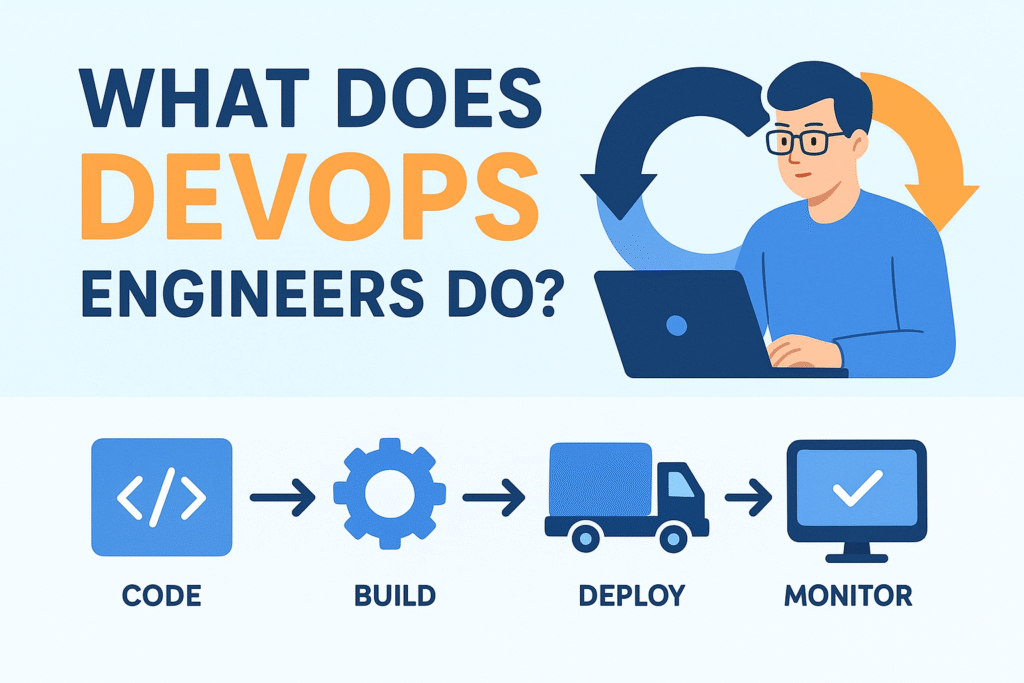Introduction to DevOps Engineering
In today’s fast-paced digital era, software development is no longer limited to just writing code. Businesses demand quick, reliable, and scalable applications that can adapt to changing user needs. This is where DevOps engineers step in. Acting as a bridge between development and operations, they ensure that software products are delivered smoothly, efficiently, and with minimal downtime.

The Evolution of DevOps in Modern Software Development
Before DevOps, developers and IT operations worked in silos. Developers wrote the code, while operations teams handled deployment and maintenance. This often led to delays, miscommunication, and bugs slipping into production. DevOps emerged as a cultural shift—promoting collaboration, automation, and continuous delivery. Today, it has become an industry standard across startups, enterprises, and cloud-native companies.
What Does a DevOps Engineer Do?
Core Responsibilities of a DevOps Engineer
A DevOps engineer is responsible for ensuring seamless software delivery pipelines. Their responsibilities include:
- Automating repetitive processes like deployments and testing.
- Managing cloud infrastructure and scaling applications.
- Implementing CI/CD (Continuous Integration and Continuous Deployment) pipelines.
- Monitoring system performance and troubleshooting issues.
- Collaborating with developers, QA teams, and system administrators.
Day-to-Day Tasks in a DevOps Role
On a typical day, a DevOps engineer might:
- Write scripts to automate infrastructure setup.
- Configure monitoring dashboards to track system health.
- Update CI/CD pipelines to reduce manual deployments.
- Review logs to detect potential security vulnerabilities.
- Collaborate with teams to optimize workflows.
Essential Skills Every DevOps Engineer Needs
Programming and Scripting Knowledge
Languages like Python, Go, Ruby, and Java are vital for automation and creating infrastructure scripts.
Cloud Computing Platforms (AWS, Azure, GCP)
Cloud expertise is non-negotiable. DevOps engineers should be comfortable deploying and managing services on Amazon Web Services (AWS), Microsoft Azure, or Google Cloud Platform (GCP).
Containerization and Orchestration Tools
Modern applications rely heavily on Docker and Kubernetes for containerization and scaling across environments.
Automation and Configuration Management
Tools like Ansible, Puppet, and Chef allow engineers to automate configuration tasks, reducing manual errors.
Monitoring, Logging, and Incident Management
Using Prometheus, Grafana, Nagios, ELK Stack (Elasticsearch, Logstash, Kibana) helps in spotting and resolving issues faster.
Version Control and Collaboration Tools
Git, GitHub, GitLab, and Bitbucket ensure smooth collaboration and version tracking among developers.
Popular DevOps Tools You Should Master
CI/CD Tools (Jenkins, GitLab CI, CircleCI)
Automating the integration and deployment cycle saves time and increases reliability.
Infrastructure as Code (Terraform, Ansible, Chef)
Managing infrastructure with code makes scaling easy and error-free.
Containerization Tools (Docker, Kubernetes)
Docker simplifies application packaging, while Kubernetes orchestrates containers across clusters.
How to Become a DevOps Engineer: Step-by-Step Roadmap
Educational Background and Prerequisites
While a computer science degree helps, it’s not mandatory. What matters more is hands-on experience.
Hands-On Learning and Real-World Projects
Build personal projects, contribute to open-source, and practice deploying apps on the cloud.
Certifications That Add Value
Some valuable certifications include:
- AWS Certified DevOps Engineer
- Microsoft Azure DevOps Solutions Expert
- Google Professional DevOps Engineer
Key Benefits of DevOps for Companies
Faster Software Delivery and Deployment
Automation shortens release cycles, allowing businesses to launch features quickly.
Improved Collaboration and Communication
Breaking silos encourages teamwork between developers, testers, and IT operations.
Increased Customer Satisfaction
Fewer bugs and faster updates lead to happier customers.
DevOps Engineer Salary and Career Growth Opportunities
According to industry reports, DevOps engineers earn among the highest salaries in IT. In the U.S., the average salary ranges from $100,000 to $140,000 annually, depending on skills, experience, and certifications. Career paths may lead to Site Reliability Engineer (SRE), Cloud Architect, or DevOps Manager roles.
Common Challenges Faced by DevOps Engineers
- Managing multi-cloud environments.
- Balancing speed with security.
- Handling legacy systems during modernization.
- Adapting to rapidly changing tools and technologies.
Future of DevOps: Trends and Emerging Technologies
The DevOps field is evolving toward AI-driven automation, GitOps, and DevSecOps (integrating security into DevOps pipelines). With businesses adopting microservices and serverless architectures, DevOps engineers will continue to play a pivotal role.
FAQs About DevOps Engineers
Q1. What is the main role of a DevOps engineer?
A DevOps engineer bridges development and operations, ensuring fast, secure, and reliable software delivery.
Q2. Do I need coding skills to become a DevOps engineer?
Yes, strong scripting and coding skills are essential for automation and CI/CD pipelines.
Q3. Is DevOps a good career in 2025?
Absolutely! With cloud adoption on the rise, DevOps is one of the fastest-growing and highest-paying IT careers.
Q4. Which tools should I learn first as a beginner?
Start with Git, Docker, Jenkins, and AWS, then gradually move to Kubernetes and Terraform.
Q5. What certifications are best for DevOps engineers?
AWS Certified DevOps Engineer, Azure DevOps Expert, and Google Professional DevOps Engineer.
Q6. Can DevOps engineers work remotely?
Yes, many DevOps roles are fully remote, especially in global tech companies.
Conclusion: Why You Should Consider a Career in DevOps
DevOps is more than just a buzzword—it’s a culture of collaboration, automation, and innovation. As a DevOps engineer, you’ll not only ensure faster and more reliable software delivery but also play a crucial role in driving business growth. With high salaries, strong demand, and limitless opportunities, DevOps is one of the most rewarding IT careers today.
🔗 External Reference: DevOps Practices on Atlassian
